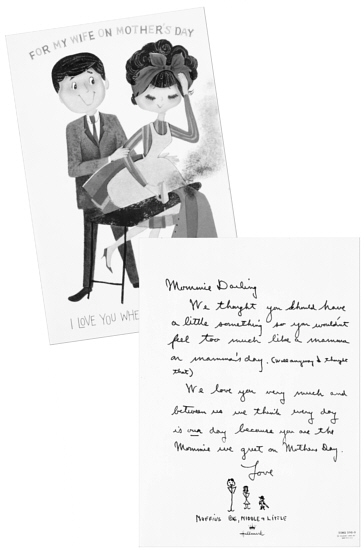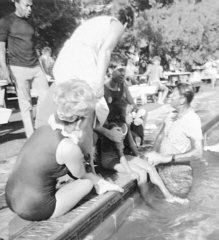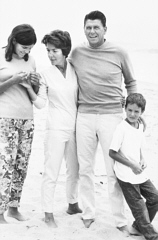I Love You, Ronnie (10 page)

However, visiting our new “home” put a damper on my enthusiasm. The so-called mansion was located on a busy commercial street, right at a stoplight. Trucks would stop and shift gears and you’d hear their air brakes resonate throughout the house. The chandeliers would rock! There were times when you’d have to stop talking, because you couldn’t hear over the noise. When my predecessor, Governor Pat Brown’s wife, Berenice, took me on a tour of the house, she showed me a room in the back where she said she would go when the noise got so bad that she couldn’t sleep. There was no place outside for eight-year-old Ron to play, and no way he or any of us could have fought our way out in case of a fire—all the windows were painted shut. The house had, in fact, been declared a fire hazard years earlier. And a hazard it was—full of dry rot, so that if a fire had ever started, it would just have taken off.
One Friday afternoon when Ron was home from school, the fire alarm went off. I grabbed his hand and we ran down the stairs and went outside. I said to the fire chief, “What happens if there’s really a fire? How does my son get out of his room?”
And he said, “Oh well, Mrs. Reagan, it’s very simple. He just goes over and takes a drawer from his chest of drawers and then runs over to the window and uses the drawer to push the window out.” That did it!
That night, when Ronnie came home, I said, “We’ve got to move. I can’t do my job as the governor’s wife and fulfill my responsibilities to our children in this house.”
So we moved. Sacramento didn’t have many houses equipped to handle what’s expected of a governor and his wife, but we did manage to find one, on Forty-fifth Street, that did just fine. The house itself wasn’t big enough for any entertaining, but it had a wonderful backyard, with beautiful camellias and a pool, so we would wait until late spring or early summer and then we’d have our parties. We’d put a floor over the pool and have an orchestra and other entertainment, or in the hot weather we’d just have swim parties. People like Jack Benny and Red Skelton would come and perform, and I’d send notes around to all the neighbors, warning them about the noise and saying I hoped not to disturb them. Soon enough, the neighbors’ kids would be crowding around, hanging over the fence to watch the entertainment. I’d invite them in, and they’d sit on the grass and listen with everyone else.

Ronnie, with instincts left over from his lifeguard days, was always aware of who was in the pool and what was going on. At one swim party, I recall, we were standing at one end of the pool when all of a sudden, without a word to anybody, he took off, dove in with his clothes and watch on, and pulled out a little girl. He stood in the water afterward, in his golf shirt and khakis, as she caught her breath by the side of the pool. Until that moment, no one else had even noticed she was in trouble.
I really loved that house. We paid rent for it—which we wouldn’t have, of course, if we’d stayed in the governor’s mansion—but it was well worth it. Unlike the mansion, the house on Forty-fifth Street was the kind of place where we could have a real family life. Ron built a tree house in the backyard and had friends over all the time. Often, they’d play football, and when Ronnie came home from work, he’d change his clothes and play with them. He told me, not long after we moved into the house, that the first time he came home and saw all the bicycles lined up out front, he knew that we’d made the right decision.And that, of course, made me very happy, because I felt I’d gone out on a limb in insisting we move out of the mansion.

Ronnie jumped into the pool in Sacramento with all his clothes on when he saw that a little girl was having trouble.
We didn’t have the ranch anymore—we’d had to sell it when we moved to Sacramento, because the taxes on it were more than Ronnie was going to earn as governor of California. But we did keep our house in Pacific Palisades. So, on the weekends and for holidays, we’d pack up Ron and our two dogs, Muffin and Lady, and go home. Patti was in boarding school and came home for holidays, too; and Mike and Maureen were grown up and living on their own. In the summers, we’d rent a beach house at Trancas, just north of Malibu, and they’d all join us there as often as they could. Having the whole family together made Ronnie very happy. I have lovely memories of those times.
Life was changing; each day was new. I found I really liked the job of being first lady of California. Ronnie and I gave dinners for returning Vietnam War prisoners, and I often visited wounded Vietnam veterans in local hospitals. I’d always end my visits by asking the men if they wanted me to call their mothers or wives. They usually said yes, and I’d go home with a list and start making calls, and the conversations would almost always be the same.
I’d say, “Hello, this is Nancy Reagan.”

With Patti and Ron on the beach at Trancas.
“Oh, come on now,” the woman would say.
“Yes, it really
is
Nancy Reagan,” I would say, and then I’d tell her that I had seen her husband or son in the hospital and that he sent his love. Then the woman would start to cry, and then I’d start to cry, and that’s how we’d finish our conversation—in tears.
I also worked with the Foster Grandparents, a program I discovered at Pacific State Hospital, which I thought was wonderful. I still think it’s one of the best programs I’ve ever seen, because it benefits both sides: children, who need love, and grandparents, elderly people, who need to feel wanted. They were matched up, and spent time together. I also wrote a Q & A column for a Sacramento newspaper, answering the questions that people wrote to me as first lady of California.
During this period—the sixties—I became more and more concerned about the problem of young people and drugs. I hadn’t known anything about the growing drug problem in America until I started reading about it in the papers and began getting calls from friends. Some of their children had gotten involved with drugs, and some—like Art Linkletter’s daughter and Charles Boyer’s son—had died of drug overdoses. I felt it was a terrible tragedy for families and that it was growing in America. What kind of response would help? There was still such a stigma attached to speaking out about drugs at that time; people were embarrassed to admit that they or their families might have a drug problem. I wanted to see if there was something I could do about it as first lady of California. I thought perhaps I could use my position to break through the silence.
I’d never known this kind of public or civic life before, and I was learning so much! Many of the interests I eventually pursued when Ronnie became president started then—the seeds were planted, and I was getting some training in civic life, which I was very grateful for later on.
Ronnie and I now had new and different things to talk about every night at dinner. And yet, for us as a couple, the heart of our life had not changed, and in fact it never did; nor did our private time together. We’d come so far, lived through so much together: parenthood and home building, career reversals, life choices and changes. But in so many ways, we were the same. I still hated it when Ronnie left the room—and he didn’t much like it when I did, either. We still shared everything. We spent as much time together as we possibly could. I just loved everything about this man!
Our fifteenth year of marriage coincided with Ronnie’s first year in the governor’s office, and the anniversary seemed to both of us like a particular milestone. I even wrote Ronnie a letter for it, which I found the other day in his desk drawer. Here are our letters to each other:
RONALD REAGAN
March 4 1967
My Darling First Lady
I’m looking at you as you lie here beside me on this fifteenth anniversary and wondering why everyone has only just discovered you are the First Lady. You’ve been the First—in fact the only—to me for fifteen years.
That sounds so strange—“fifteen years.” It still seems like minutes, they’ve gone by so swiftly. If I have any regret it is only for the days we’ve been apart and I’ve had to awaken without watching you. Someday, you’ll have to explain how you can be five years old when you sleep and for fifteen years yet. But then maybe it has something to do with my only being fifteen—because I wasn’t living before I began watching you.
Thank you for all my life and living and for happiness as complete as one can have on this earth.
I love you so much and so much more each day.
Your Husband
My darling husband,
You beat me to it this morning ’cause I was going to write you—
I can never say what I really feel in my heart to you ’cause I get puddled up—and you always say everything so much better. But I too can’t believe it’s fifteen (16!) years. In another way tho’ it seems like forever—I really can’t even remember a life before you now. Everything began with you. My whole life—so you’d better be careful and take care of yourself because there’d be nothing and I’d be no one without you—
I love you so much—I never thought I could love you more than the day we were married but I do—and I’m so proud of you—every day—I could pop—It just keeps getting bigger and bigger—those poor other mommies—they don’t have a you—but I do—and I hope you’ll always have a me.
xxx
And when separations arose, we still took them very, very badly.
Dear Mommie,
The Gov. slept here—but not well. We have to stop this silly business. In fact I may buy a tent, load the jeep, take you away from all your friends & go live on our mountain. Then we’ll only talk to each other.
I love you & I’ll see you Sunday.
The Travelling, Non Sleeping
Guv.
In Sacramento, Ronnie and I still looked after each other the way we always had. For me as a wife this meant, first and foremost, making a comfortable home for Ronnie and the family. For me as first lady, it also meant making the California governor’s office a comfortable place to work.
It was far from that when Ronnie first moved into his office. In fact, the only thing Pat Brown had left behind was a tomahawk hanging on a wall. The carpeting was full of holes. Some of them had been patched—but not in the same color. It all looked awful!
I think that if you have pleasant surroundings, you can work better. I wanted to redecorate Ronnie’s office and get it done for his birthday, on February 6, 1967. Somehow, with a lot of help, I did. Then I redid the conference room next door. Then I redid the outer office, where the secretaries worked. (Once you started fixing up one room, the others looked so terrible by comparison!) Then I fixed up the hallways. In storage, I found wonderful old pictures of Sacramento, and I lined the halls with them so schoolchildren could learn about the city when they came through to visit the governor’s office.
I really enjoyed myself doing this, and Ronnie was just delighted. So was everyone else who worked in the office. They laughed when, as a finishing touch, I took a huge jar of jelly beans that a friend had sent to Ronnie and put it on his desk. But I also noticed that it was the first thing people went for when they came into the office to meet with him.
